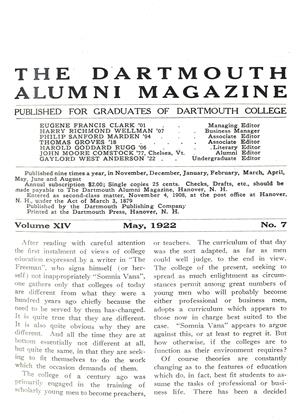"A Student's Philosophy of Religion" by Professor William Kelly Wright, published by the Macmillan Company, will be reviewed in a later issue of the magazine.
Towards the Great Peace. Ralph Adams Cram. Boston: Marshall Jones Company. 1922. Pp. 1-vii-264.
In this book, one of the Dartmouth Alumni Lectureships for 1921, the writer suggests remedies for the ills of modern society revealed in ghastly fashion by the World War. He contends, in eloquent language, that with the Renaissance and the Reformation began a period of decadence of which the war is the logical result. The individualism of the Renaissance flowered into the Machia vellianism of (the Absolute state, as seen under Louis XIV, from which the oppressed proletariat revolted and paved the way for democracy or the rule of the masses with their ignorance, incompetency and spurious ideas of equality. Hand in glove with democracy arose a "sordid and profligate ordering of society" or capitalism, whose incentive is gain, whose measure of values is money, whose willing servant is the machine and whose prime minister is financial imperialism. Religion, which should have supplied the corrective for the evils of this "industrial-financial-democratic scheme of life," has been weakened by the particularism of Protestantism, its repudiation of sacramentarianism and is faith-destroying intellectualism. The result is that religion has "compounded with the absolutism and tyranny" of the state, "compromised with the cruelty, selfishness, injustice and avarice of industrialism" and sought an impossible peace with "physical science, materialistic philosophy and social revolution" to its own thorough discrediting. The remedy for our evil estate is to be found, according to Mr. Cram, in a return, in so far as this is possible, to the feudal society of the thirteenth and fourteenth centuries when men worked in the guilds for the love of it and not for wages or profits, as today, when chivalry and honor were real social forces because knighthood was in flower, when rulers held office not for the sake of the spoils but as a trust from God, and when religion provided the inspiration for conduct and the all-inclusive scale of values for society.
Mr. Cram contends that all the good in democracy has been derived from the Catholic Christianity of the Middle Ages (P-77); that the period of the inception of the Industrial Revolution was the blackest half-century civilization has had to record' (p. 86); that the Reformation was the "resuit of clever, stupid or perverse minds working overtime on religious problems" (p. 204) ; that "democracies always govern too much" (p. 143);- that "post-Renaissance philosophies are one and all definitely anti-religious" (p. 41); that the essence of Christianity is sacramentalism (p. 49) upon which the new society is to be based (p. S3); that the quantitative standard, the basis of exact science, is "malignant and pathological," "the nemesis of culture," even "of civilization itself"; that we must class among the "evils" of the time "specialization," ' concentration of industries," "the factory system," "high finance," "capitalism," and "pragmatic philosophy" (p. 49). These are, as Mr. Cram admits, "hard sayings," and to get the most from this unusual book it must be read as the passionate revolt of a deeply religious, morally sensitive and artistically refined nature against the impiety, the materialism and wrong of modern life. The chapter on the Industrial Problem, in some ways the best in the book, shows real insight and contains a telling and eloquent indictment of our commercialized society, though the suggested return to the simple, self-contained domestic economy of the Middle Ages is hardly adequate as a solution to the problem.
Religion is for Mr. Cram the primum mobile of his ideal social order, and yet in his interesting chapter on religion he continually identifies it with the supernatural', not to say magical, efficacy of the sacraments while failing to see the tremendous role religion played in the mediaeval world-view as the bond that unites nature, society andl God in one vast, articulate system of values. Just as we are all grateful to Mr. Cram for the charming Gothic reproductions which he has scattered throughout our American cities, so we have him to thank also for this interesting plea for a return to the devout and chivalrous mediaeval ideal of a Christianized and unified social order.
March 15, 1922.
 View Full Issue
View Full Issue
More From This Issue
JOHN M. MECKLIN
-
 Books
BooksThe Principles of Sociology
May, 1924 By John M. Mecklin -
 Books
BooksProhibition
FEBRUARY, 1928 By John M. Mecklin -
 Books
BooksMANUFACTURING
FEBRUARY 1929 By John M. Mecklin -
 Books
BooksCOLLECTED PAPERS OP HERBERT DARLING FOSTER
APRIL 1930 By John M. Mecklin -
 Books
BooksAMERICAN HERETICS AND SAINTS
November 1938 By John M. Mecklin
Books
-
 Books
BooksFaculty Publications
APRIL, 1927 -
 Books
BooksTHE LAND OF THE POLISH PEOPLE
December 1943 -
 Books
BooksTHE BOORN MYSTERY
November 1937 By H. H. Jackson -
 Books
BooksROBERT FROST POETRY AND PROSE.
DECEMBER 1972 By JOHN HURD '21 -
 Books
BooksGENERAL AND SPECIFIC ATTITUDES
MAY 1932 By Maurice H. Mandelbaum -
 Books
BooksAN OUTLINE OF ECONOMIC PRINCIPLES AND PROBLEMS
February 1940 By Richard L. Funkhouser '30








